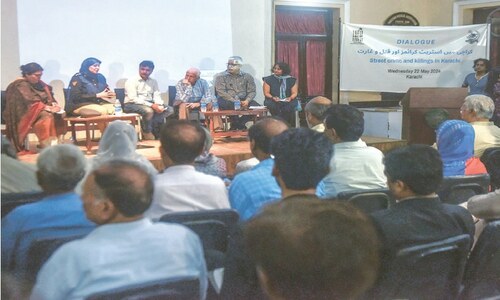KARACHI, Jan 3: A tussle between bureaucrats of the Sindh health department and the principals of five government medical colleges in the province has led to freezing of several bank accounts of the colleges and enforcement of a new standard operating procedure for spending non-government fund.
Under the new procedure, the health department bureaucrats have acquired the authority to monitor and grant permission for the spending of this non- government fund which comes both in Pakistan rupees as well as in US dollars.
The non-government funds is generated by the medical colleges by offering admissions to students under the self-finance scheme. These students, foreign nationals, overseas Pakistanis and Pakistanis, are accommodated against extra payment though they do not come on merit.
A health department report given to the Sindh governor accuses the principals of all the five medical colleges of glaring discrepancies in maintaining, operating and spending of the funds generated in the past 11 years under the self-finance scheme. A sum of Rs8.71 million is generated every year under the self-finance scheme.
Dow Medical College was found to have spent almost 100m rupees in the past 11 years when six principals came one after another. Sindh Medical College’s spending was about Rs39m, Chandka Medical College, Larkana, about Rs41m, People’s Medical College, Nawabshah, about Rs30m and Liaquat University of Medical sciences about Rs47m.
Reporting to the governor of this spending of about Rs245m in the past 11 years, the Sindh health secretary, Khalid Latif Chaudhry, pointed out that most of the principals and the drawing and disbursement officers had violated the codal formalities as laid down under the Financial Rules 1962 and the Purchase Manual 1971. “In certain places serious irregularities have been committed, which require further probe and inquiries,” the secretary said and recommended that the case might be referred to any agency as the appropriate authority deemed fit.
“Education being a costly affair all over the world is always a heavy load on the state’s exchequer,” is the justification of the Sindh government to introduce self-finance scheme in the medical colleges since 1991. Under this scheme, eight seats are offered to foreign nationals in each of the five medical colleges against the payment of 7,500 US dollars a year for each student. Four seats are offered to overseas Pakistanis in each of the five medical colleges against the payment of 5,000 US dollars each. 25 Pakistani students are accommodated in each of the five medical colleges on payment of Rs150,000.
An inspection team found that every college was operating several accounts of non-government funds. These were rupee as well as foreign currency accounts. People’s Medical College was running 24 bank accounts and having a balance of Rs2.67m. The SMC was having 19 bank accounts with Rs2.35m balance, Chandka 21 bank accounts with Rs2.98m, Liaquat Medical 13 bank accounts with Rs915 thousand and Dow Medical College six bank accounts with Rs2.79m.
Several discrepancies were found in the spending of the money taken out irregularly from these accounts and objections have been raised.
Under the new standard operating procedure, the health department wants the setting up of a fund management committee to be headed by the principal having three other members. This committee will meet regularly once a month and keep the health department posted of the update position of the non-government bank account.
The health department will exercise control over the 50 per cent of rupee funds generated under the self-finance scheme. The medical colleges have been asked to deposit 50 per cent of the rupees amount of non-government fund in fixed deposit in bank or investment in a government scheme. This amount will not be available for the annual expenditure budget without approval of the department.
All foreign currency funds will be placed in term and fixed deposits and will be available for annual expenditure budget with the written approval of the department.
The department has instructed that 15 per cent of the funds be utilized in teaching hospitals, two per cent be used by the department itself and one per cent for auditing expenses. The health department will have the authority to appoint auditors.















































Dear visitor, the comments section is undergoing an overhaul and will return soon.